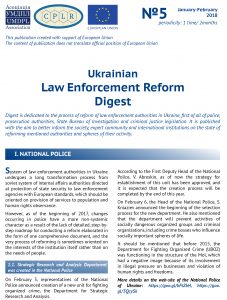NB: the article is published on the web site of Ukrayinska Pravda.
The MIA has developed a Disciplinary Statute of the National Police, which doesn’t meet European standards and turn police officers into compliant and deprived of rights components of the administrative system, ready to perform any directions.
Adoption of the “Law on National Police” on July 2, 2015, became an important stage in reformation of the Ministry of Internal Affairs and creation of the new police. But this law is being realized along with the Disciplinary Statute of Law Enforcement Bodies, which was adopted 10 years ago (as of 2006).
It is impossible to build a new body in accordance with European standards in the field of relations with citizens, if internal rules of relations between police officers and their governing body remain “soviet”. Taking this into consideration, the government on the proposal of the Ministry of Internal Affairs put forward a project to the parliament No.4670 on the Disciplinary Statute of the National Police, which have already been supported in the first reading and is awaiting its approval.
Leadership of the MIA does try to provide not only decent remuneration of labor and social support, but also offers to introduce an unknown in the democratic world “presumption of rightness of police officers”.
Considering this we may have been anticipated wider rights of police officers and stronger guaranties of their activities in the new Disciplinary Statute of the Police.
Instead, the reality is opposite.
Heads of the MIA don’t need self-sufficient and independent police officers. They need compliant and deprived of rights components of the administrative system, ready to perform any directions.
Thus, the project of the Disciplinary Statute lacks comprehensive list of offences, which may make the police officers liable or cause a dismissal.
It opens huge possibilities for the police leadership to abuse “undesirable” officers. Policemen will never know which misdeeds will be punished and which will be encouraged. And the leadership will be able to use the law “by analogy”. Continue reading “Oleksandr Banchuk: Disciplinary Statute of the National Police: police officers – not human?” →
 Ukrainian Law Enforcement Reform Digest. Issue 5: January-February 2018. – Kyiv: Association UMDPL, CPLR, 2018. – 8 pages.
Ukrainian Law Enforcement Reform Digest. Issue 5: January-February 2018. – Kyiv: Association UMDPL, CPLR, 2018. – 8 pages.